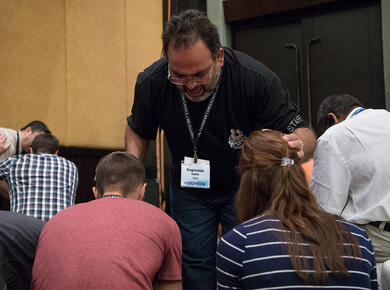Posted: January 11, 2024
Brazil
Sometimes, it’s not an option to discuss difficult topics. Conflicts arise, but we can build something new instead of shattering the old.
In 2011, the Mennonite Brethren church in Brazil (COBIM) faced difficult conversations. God had brought leaders from other denominations into COBIM. Now we had to learn how to handle these differences. The traditional MB leaders had not planned to bring in these pastors from different backgrounds; they had certainly not planned to become MBs.
I was one of the latter. As an Assemblies of God pastor, I preached once at a Mennonite Brethren church and vowed never again.
But after moving to a suburb of Curitiba in 2006, a series of Holy Spirit promptings led me into an MB church again and again. After several months of involvement and becoming a member, in October 2007, the pastor invited me and my wife to be pastors.
God was doing some very big things in that congregation. What God was doing locally started moving in direction of the national church.
When we got together in conferences, we would see the differences in way of worship, in way of praying, in way of preaching. We had differences of culture between German and Portuguese; between an individualist culture and a collectivist culture. These were apparent.
Who was right? Those who were more traditional or those who were more Pentecostal?
God who sees everything said: “I will mix these two. We want to build something new where no one is right and wrong, but both are right and both are wrong and we bind both together.”
We decided to create a wider path where traditional and more charismatic could live together. Where both can respect and teach other: where we complement each other.
The Pentecostal folk who had gotten inserted in Anabaptist culture have to learn from this Anabaptist movement. But we also have to share what we have received.
It takes a lot of talking.
We pointed out one side. We showed the other side. We defined our limits so we could cooperate.
We wanted our strengths to converge, not to fight or bring power tensions.
There were many moments that were difficult.
Several times, I received tap on shoulder to ask: “How long will you stay here yet?” They implied that I should take my different-ness and go elsewhere.
Another time at a conference of pastors, some were making light about the work of the Holy Spirit, and how people react with emotion. My heart was heavy that they should take something so serious and made jokes about it.
But I felt the Lord calling me to be patient. God was going to do a something new. If people were not willing to change, God would deal with it.
Over the next period, the leaders who had been most resistant to change each left the MB church, for a variety of reasons.
These leaders were not bad leaders nor sinful, they just couldn’t see what God wanted to do. Their convictions based on their background and what they had learned were stronger than what the Lord wanted to do.
I think of when the Spirit came upon the Gentiles. The leaders didn’t understand why God would go to the Gentiles. But they were open to understand the Lord was doing a new thing, building a “jug” of blessing from the mixed “clay” of Jews and Gentiles with the water of the Holy Spirit.
In COBIM, God provided a “Barnabas” for me – named Paul. He is a “traditional” Mennonite Brethren, with a father from Russia and a mother who studied in Goshen College, USA.
After a career in international business – which opened his eyes to different ways of doing – he became involved in church leadership. His background allows him in a sense to “interpret” the charismatic movement into the culture of Anabaptists. People need a bridge; new ways are not just downloaded.
As we learn to live with difference, we pray for each other. It shows an attitude of your heart.
I have learned much from studying Anabaptist history. Through the traditional MBs, God led me to his Word. When I share a prophetic word, it is grounded in Scripture and joint discernment.
Step by step, two very different groups within COBIM are taking our differences and going in a smooth way. We could try to make it white or black – or we can create a path where we understand that if this one can go this far, the other can go this far, and we can go together.
“We have all our backgrounds,” says Paul, “but when we are open, God shows us things through Scripture and through experience.”
In the past, the clash of cultures hindered. Now. when we have problems, we don’t each go to our own side, but instead we sit together. We must be open to understand God works in different ways (see like Larry Miller’s three practices for building communion).
What did God do with the conflict in COBIM? God gave some charismatic leaders open hearts to hear and learn. God gave traditional MBs open hearts to hear and to love. God brought us together so the kingdom of God is multiplied, in Brazil and the world.
—Reginaldo Valim is pastor of Igreja Evangélica Irmãos Menonitas (Mennonite Brethren) de Campo Grande MS, in Brazil.



Join the Conversation on Social Media
FacebookTwitterInstagramFlickrYouTube